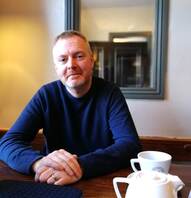|
Short Fiction ~ Neil Campbell (Second Prize, Strands International Flash Fiction Competition -6) When I first moved in, my father’s things filled the flat. It took me a good two years before I could bring myself to throw any of it out, but gradually I started taking it to the charity shops. Soon, all I had left were the paintings and photographs he had on the wall. I had grown to like them, especially the photograph that was in his bedroom – the one where the woman had an exposed breast. And then there were the letters from his women. I didn’t love my father. Nor had I ever worshipped him, not even as a child when you were supposed to. He never kissed or cuddled me. He would pat my head. He never spent time with me either – always away on business. I was never quite sure what he did all those years. I wondered how my mother had felt about the letters. Had she ever seen them? Did she know about his women? One day, I received a letter from a woman saying how sorry she had been to hear of my father’s death. The fact of receiving an actual letter was strange enough, but how did she know he had died? She also purported to have been my father’s lover – she said she could prove it. Had I ever seen a photograph of a woman with one breast hanging out? Well that was her, she said. How could she have known that, I wondered? Did he take the same picture of all his women? Could you put them all together and fill a gallery with their faces? We met in my favourite café on the corner of Half Moon Lane – I will never forget it – and though she had obviously aged I knew straightaway it must be her – I’d looked at that photograph so often. She complimented me on my hair and skin and I felt at ease with her from the start. Her hair had turned grey, and it hung down in plaits, which she fiddled with all the time, unravelling and ravelling them. ‘It was brave of your parents to adopt you,’ she said, all the time playing with her hair. ‘Ironic, your father never wanted children when we were together. Little did we know. He used to tell me how people stared at you or made comments. And this was in supposedly metropolitan London. I can imagine how bad it would be if you lived somewhere else.’ We ordered another pot of tea and sat looking out of the window. My silence encouraged her to talk. It was like she hadn’t told anybody anything about her life for a long time. ‘I’m sorry to tell you this, but I know I was the love of your father’s life. I always liked your mother, she was good for him, got him off the drink, but with me he was wild, we had some wild times. Especially when we went to Brighton for the weekend. Do you know the Lido here? We got naked in there once and they threw us out. I was always taking my clothes off in those days. I had nothing to hide. I walk around my flat naked, even now. You should do it, it’s a liberating thing.’ I smiled, and she continued, ‘There is one thing I would like to ask you. I am happy being old, I’m happier now than I’ve ever been. Since my own husband died, which was obviously very painful, I’ve felt a freedom greater than ever before. And because my mind is not what it was – I used to have a photographic memory – I find my memories falling away day by day. In many ways, that is a good thing, believe me, one forgets all the mistakes one has made. But I’m losing the good memories too. So, what I would like to ask is, could you possibly let me have the photograph that your father took of me? The one you say is still on the wall in his bedroom?’ I agreed, of course. It was of more value to her than me, though I liked the picture. It was a beautiful breast. Maybe that was what I’d always looked at, rather than her face. I said I would get the photograph for her, and we arranged to meet later that day, once again in my favourite café on the corner of Half Moon Lane. When I took the photo off the wall I turned it to the light and saw the face in the picture more clearly, in a different aspect, and something about it troubled me. I dusted the photo – I had always been terrible at cleaning – and again a glimpse of the face made me ill at ease. Nevertheless, I wrapped the photo in a brown paper bag and put it in my handbag and returned to the café. She was already there when I returned, fiddling with her plaits, her face bright with expectation. I sat down opposite her, in the window, and passed her the brown paper bag, which she took off me with trembling hands.  Neil Campbell is from Manchester, England and his latest novel Lanyards, the third part of a Manchester trilogy, is out now. http://ncampbellwriter.wixsite.com/website
0 Comments
Leave a Reply. |
StrandsFiction~Poetry~Translations~Reviews~Interviews~Visual Arts Archives
April 2024
Categories |
 RSS Feed
RSS Feed